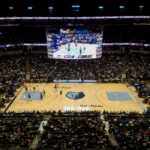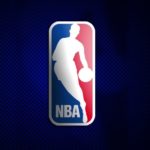 While we’re a little ways away from actually awarding medals for 2012 Olympic basketball, the first round showed international hoops fans quite a lot. Though the fat lady hasn’t sung yet, reputations have changed over the past five games to cause some individual and/or teams losses beyond these Olympics. BallinEurope today takes a look at those whose stock has risen and those who’ve fallen in the early going of the London Games.
While we’re a little ways away from actually awarding medals for 2012 Olympic basketball, the first round showed international hoops fans quite a lot. Though the fat lady hasn’t sung yet, reputations have changed over the past five games to cause some individual and/or teams losses beyond these Olympics. BallinEurope today takes a look at those whose stock has risen and those who’ve fallen in the early going of the London Games.
Rising
• Lebron James. Yeah, like this guy needs a further upward trend in his already all-time lofty-looking career. Four years ago, ESPN’s Bill Simmons proclaimed (correctly, in BiE’s opinion) that in 2008 ‘Games crunch time, “everyone deferred to Kobe, who made some monster plays to clinch it. Know that in the history of the NBA we have never had the best-player-alive argument resolved so organically.” In 2012, King James has proven himself to be the best player on the best team in this Olympic tournament.
Forget Carmelo Anthony’s 37 points in the Nigeria circus and Lebron’s relatively low point totals: James’ irrepressible presence on both ends has made him the glue guy for this Team USA as he plays nearly flawless basketball. (For example, check out his eight steals versus just five turnovers, of which at least three came on travelling calls by BiE’s count.) Lebron started the tournament with a France-flummoxing nine-point, eight-rebound, two-steal performance; Team USA’s last two games were fueled by James’ 14-of-19 shooting for a combined 38 against talented Lithuania and Argentina sides.
Does the Olympic tournament have an MVP? If so, James has this in the bag with a USA gold.
• Ricky Rubio. Would Spain be looking better right now if the young Timberwolf were in the driver’s seat? Irrelevant. What matters is that so many are asking the question itself, raising the Spaniard’s reputation while rehabbing an injury.
 • Russian basketball (and specifically CSKA Moscow, plus the Minnesota Timberwolves). Lost amid the 20th anniversary celebrations of those three dream teams of ’92 is the story of Team Russia. It’s tough to sympathize with the crumbling of a superpower that had depended on Lithuanians and Ukrainians to build a sports machine, but the admirable resurrection of a great basketball culture has already been nice to see.
• Russian basketball (and specifically CSKA Moscow, plus the Minnesota Timberwolves). Lost amid the 20th anniversary celebrations of those three dream teams of ’92 is the story of Team Russia. It’s tough to sympathize with the crumbling of a superpower that had depended on Lithuanians and Ukrainians to build a sports machine, but the admirable resurrection of a great basketball culture has already been nice to see.
And how about that Red Army? CSKA Moscow contributed six players to the Team Russia roster: Andrei Kirilenko, Sasha Kaun, Viktor Khryapa, Anton Ponkrashov, Alexey Shved, Eugeny Voronov. Excepting Voronov, the Euroleague runners-up have combined with Timofey Mozgov, Vitaliy Fridzon and Sergei Monya to comprise the eight getting the lion’s share of Russian minutes thus far. Accordingly, they’ve produced accordingly, accounting for 63.25% of team points, 67.6% of rebounds and a whopping 78.1% of assists.
Going forward, four of the Moscow six (Kaun, Khryapa, Ponkrashov, Voronov) are committed to CSKA for 2011-12 while the other two (Kirilenko, Shved) join Minnesota. So what are we looking at, then? A Euroleague championship and a serious playoff run by Love and the Eurowolves for the latter…?
• Also Kirilenko, who’s got to be in pole position for the FIBA European Player of the Year award.
• The Oklahoma City Thunder. Kevin Durant. Russell Westbrook. The Beard (who actually turned in perhaps both the highlight and lowlight of the Team USA run through the group stage). Nice handling of Tony Parker. Damn, these guys are gonna be good next year.
• Team France. Just one year after Les Bleus recorded their finest finish in an international tournament with a silver at Eurobasket 2011, a podium finish at the Olympics suddenly seems plausible. Kirilenko’s apparent chief rival for top Euro of ’12, Tony Parker, once again is giving a clinic on how to fill the playmaker role in international play – at least against world-class sides that don’t have Team USA’s blistering speed.
Even more notable, however, is the way France hasn’t lost a step without their top rebounder and a seemingly key element to the success of ’11. No Joakim Noah? No problem! Les Bleus were second-high in defensive rebounds in pool play at a big 28.3 per game, a particularly crucial factor in denying Lithuania and Argentina the second-chance points those squads thrive on. Says incoming San Antonio Spur Nando de Colo: “Our aggressiveness is key.” Indeed – but who would have guessed that in 2012 France would bring a more physical and driven team than Spain?
• Team Britain. There’s no way BiE can rain on the victory parade for fledgling Team Britain’s first Olympic win since 1948 – “the greatest day in British basketball,” even – so kudos. On the other hand, these guys might also be included as among those whose stock is…
Falling
• Team Britain. Look: Barring some miracle naturalization, this was the British dream team for the foreseeable future. With the angst of the British sports fan well-documented during these Games, this side ultimately looks like just another depressing chapter.
Saddling with perhaps the tournament’s toughest opening three games, all Britain realistically needed to do was give the Andrew Bogut-less Team Australia a game. They didn’t. And while the team were proud of their win against China, that may be the last such victory for a while. The surprisingly good Nate Reinking is at his peak; head coach David Finch, essentially the architect crafting the national program for the past seven years, has retired from the post; and how many more summertime contributions from Luol Deng, Pops Mensah-Bonsu and Joel Freeland can we expect?
Gloomy skies over British basketball; imagine that.
 • Dwight Howard. Who needs him? Apparently not Team USA. And maybe not the Brooklyn Nets, Los Angeles Lakers and Houston Rockets, either.
• Dwight Howard. Who needs him? Apparently not Team USA. And maybe not the Brooklyn Nets, Los Angeles Lakers and Houston Rockets, either.
• Los Angeles Lakers. After Howard, attitude monster Andrew Bynum might have filled the big man role for Team USA after an superstar-level season but wasn’t asked. Missed free throw aside, Pau Gasol has played well enough for the aging Team Spain but ultimately will be judged on Los Rojos’ final result.
Finally, Kobe, no longer the alpha dog for the Americans, hasn’t truly managed to find his rhythm in the under-15 minutes of playing time per game he’s been seeing. After the eight-point outburst in the first quarter against France, the Mamba has yet to tee off. While Bryant is surely accepting a limited role in Coach K’s rotation, what Team USA backer doesn’t want to see a little of Kobe’s explosiveness before this thing is over.
As a Laker fan, given the nice play of Thunderers and Spurs in this tournament, we might want to be a little concerned about our guys going into … oh, wait. We’ve got Steve Nash. Showtime, baby!
• Jonas Valanciunas. Like Bryant for the USA, Valanciunas is probably accepting of his (albeit a bit more puzzling) limited role for Lithuania. Valanciunas’ woes and lack of playing time were mulled over by BiE after game four and this point one wonders if Valanciunas regrets taking up the national-team offer in lieu of more training with the Rockets.
 • Team Spain. First off, if Sergio Scariolo’s guys did tank against Brazil – and BiE doesn’t believe they did – such cowardice would hardly be the sole disappointment in this tournament so far. BiE still believes the recent domination by España in international play is on hold, the now visible chinks in the armor similar to those experienced by the formerly invulnerable USA, circa 2000. And like those American nightmare teams of lore, Spain right now looks better on paper than on the hardwood.
• Team Spain. First off, if Sergio Scariolo’s guys did tank against Brazil – and BiE doesn’t believe they did – such cowardice would hardly be the sole disappointment in this tournament so far. BiE still believes the recent domination by España in international play is on hold, the now visible chinks in the armor similar to those experienced by the formerly invulnerable USA, circa 2000. And like those American nightmare teams of lore, Spain right now looks better on paper than on the hardwood.
Other teams in this tournament (Russia, Brazil, even France) have adapted to the Spanish blueprint developed over the past two decades by combining length, athleticism and more physical play – and they’re doing it in 2012 with younger, fresher talent. The message running alongside “we no longer fear Team USA” is several national squads can run with a lax Team Spain.
Things don’t look great for Spain’s chances in the tournament round, either. With anything short of a silver medal bound to be considered a failure, Spain gets well-familiarized and revenge-minded France; this is likely followed by Russia, who played its finest game against Los Rojos in pool play. With time left to salvage its international reputation, Team Spain must reach back to, say, 2006 and find that spark. Like, soon.



